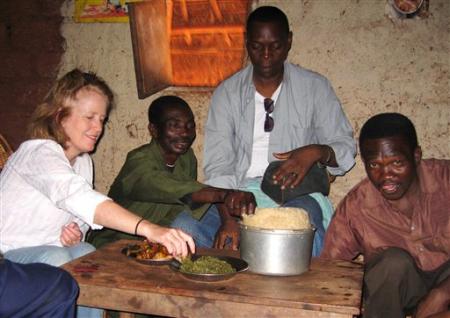2006.08.31: August 31, 2006: Headlines: COS - Congo Kinshasa: Journalism: Washington Post: Journalist Beth Duff-Brownr returns to the village of Kamponde in the Democratic Republic of Congo where she was a Peace Corps volunteer from 1979 to 1981
Peace Corps Online:
Directory:
Congo - Kinshasa (Zaire):
Special Report: Journalist and Congo Kinshasa RPCV Beth Duff-Brown:
2006.08.31: August 31, 2006: Headlines: COS - Congo Kinshasa: Journalism: Washington Post: Journalist Beth Duff-Brownr returns to the village of Kamponde in the Democratic Republic of Congo where she was a Peace Corps volunteer from 1979 to 1981
Journalist Beth Duff-Brownr returns to the village of Kamponde in the Democratic Republic of Congo where she was a Peace Corps volunteer from 1979 to 1981

"But now I'm returning, 25 years after I was the last Peace Corps volunteer in Kamponde, a small village in the south-central province of Kasai Occidental. I returned 10 years ago for a story about how the village had changed over the years and how much the villagers had shaped my decisions later in life _ leading me to journalism and grounding me with blessings that many Americans forget to count. The villagers were saddened then to learn that despite years of marriage, and in what they viewed as my seriously advancing age _ the average life expectancy in Congo is only 49 and I was fast approaching 40 _ that I was childless. They promised to pray to their Buntu gods and the Roman Catholic one imposed on them by Belgian colonialists that we would be blessed with a baby."
Journalist Beth Duff-Brownr returns to the village of Kamponde in the Democratic Republic of Congo where she was a Peace Corps volunteer from 1979 to 1981
AP Blog From Visit to Congo
By The Associated Press
The Associated Press
Thursday, August 31, 2006; 3:34 PM
-- AP chief of bureau for Canada, Beth Duff-Brown, is in the Democratic Republic of Congo, which she visited many times as a West Africa correspondent in the mid-1990s. She has returned to visit to a remote village in central Congo, where she was a Peace Corps volunteer from 1979 to 1981.
[Excerpt]
SATURDAY, Aug. 26, 5:30 p.m. local
KINSHASA, Democratic Republic of Congo
Landing in Kinshasa and looking down on the bloated Congo River brings tears to my eyes. On the first day of what my daughter calls "Mama's African Adventure," I recall how many times I crossed that river, back when the Democratic Republic of Congo was called Zaire. It was how I reached other villages, visited friends and escaped the chaos in the capital. Once I went to hunt down a rumored white crocodile, instead coming across an unfriendly family of hippos.
The first time I crossed the Congo River was 27 years ago. I joined the Peace Corps and had the good fortune of being posted to one of the most complex and colorful countries in Africa. The last time I made the crossing was in 1997, on a ferry from Brazzaville, capital of the neighboring Republic of Congo. Yes, the names are confusing and deceptive: The Republic has the democracy that the Democratic Republic lacks, though it is attempting it for the first time since its first prime minister, Patrice Lumumba, was assassinated in 1961 and then-General Mobutu Sese Seko declared himself president.
I had crossed the river that last time to get to Kinshasa, where the airport closed as rebels approached the city in an attempt to overthrow Mobutu. In a scrum of other foreign correspondents, I finally met and interviewed the legendary Mobutu, one of the longest-serving dictators in Africa and still sporting his signature leopardskin toque, which many Congolese believed held the magic that kept him in power for more than three decades. Joseph Kabila, the son of the rebel leader who finally brought him down, is now facing a runoff election to lead this massive country of 58 million people. In 1997, I was covering West Africa for the AP, but pregnant and knowing I could no longer cover the civil wars of Sierra Leone and Liberia, and believing that my Congo trip would be my last.
But now I'm returning, 25 years after I was the last Peace Corps volunteer in Kamponde, a small village in the south-central province of Kasai Occidental. I returned 10 years ago for a story about how the village had changed over the years and how much the villagers had shaped my decisions later in life _ leading me to journalism and grounding me with blessings that many Americans forget to count. The villagers were saddened then to learn that despite years of marriage, and in what they viewed as my seriously advancing age _ the average life expectancy in Congo is only 49 and I was fast approaching 40 _ that I was childless. They promised to pray to their Buntu gods and the Roman Catholic one imposed on them by Belgian colonialists that we would be blessed with a baby.
Several months later, those prayers appeared to have been heard. But I had no way of communicating with Kamponde, a village where the train no longer stops, where there is no running water or electricity and certainly no post office or telephone lines.
Now, I'm returning to thank them for their prayers and introduce them to Caitlin, via video and photos and family stories around the fire with a calabash of palm wine. I'm carrying photos of other Peace Corps villagers who were there before me, Melanie, Doug and Yale, who also sent photos of their children, prized in a country where family is often all one has.
More than 4 million people have died in fighting or war-induced hunger and disease since rival rebel groups began fighting across the Congo just before my last visit, more deaths than in any other conflict since World War II. Violence last week, when a runoff election was declared, claimed another 31 lives in the capital. I'm anxious to learn how Kamponde has fared.
In Kinshasa only for several hours, much is as I remembered. Shakedowns by soldiers at the airport and along the road that takes you into what was once called Kin-la-belle for its wide boulevards and leafy beauty. The ubiquitous "pousse-pousse," or rickshaw pushers carrying people and goods across open sewage.
Yet many of those people are shouting into cellphones. And here in my grim-but-clean hotel, I'm writing this on a wireless Internet connection.
Links to Related Topics (Tags):
Headlines: August, 2006; RPCV Beth Duff-Brown (Congo Kinsasha); COS - Congo Kinshasa; Journalism; Return to our Country of Service - Congo Kinshasa
When this story was posted in November 2006, this was on the front page of PCOL:





Peace Corps Online The Independent News Forum serving Returned Peace Corps Volunteers
 | Ron Tschetter in Morocco and Jordan
On his first official trip since being confirmed as Peace Corps Director, Ron Tschetter (shown at left with PCV Tia Tucker) is on a ten day trip to Morocco and Jordan. Traveling with his wife (Both are RPCVs.), Tschetter met with volunteers in Morocco working in environment, youth development, health, and small business development. He began his trip to Jordan by meeting with His Majesty King Abdullah II and Her Majesty Queen Rania Al Abdullah and discussed expanding the program there in the near future. |
 | Chris Dodd's Vision for the Peace Corps
Senator Chris Dodd (RPCV Dominican Republic) spoke at the ceremony for this year's Shriver Award and elaborated on issues he raised at Ron Tschetter's hearings. Dodd plans to introduce legislation that may include: setting aside a portion of Peace Corps' budget as seed money for demonstration projects and third goal activities (after adjusting the annual budget upward to accommodate the added expense), more volunteer input into Peace Corps operations, removing medical, healthcare and tax impediments that discourage older volunteers, providing more transparency in the medical screening and appeals process, a more comprehensive health safety net for recently-returned volunteers, and authorizing volunteers to accept, under certain circumstances, private donations to support their development projects. He plans to circulate draft legislation for review to members of the Peace Corps community and welcomes RPCV comments. |
 | He served with honor
One year ago, Staff Sgt. Robert J. Paul (RPCV Kenya) carried on an ongoing dialog on this website on the military and the peace corps and his role as a member of a Civil Affairs Team in Iraq and Afghanistan. We have just received a report that Sargeant Paul has been killed by a car bomb in Kabul. Words cannot express our feeling of loss for this tremendous injury to the entire RPCV community. Most of us didn't know him personally but we knew him from his words. Our thoughts go out to his family and friends. He was one of ours and he served with honor. |
 | Peace Corps' Screening and Medical Clearance
The purpose of Peace Corps' screening and medical clearance process is to ensure safe accommodation for applicants and minimize undue risk exposure for volunteers to allow PCVS to complete their service without compromising their entry health status. To further these goals, PCOL has obtained a copy of the Peace Corps Screening Guidelines Manual through the Freedom of Information Act (FOIA) and has posted it in the "Peace Corps Library." Applicants and Medical Professionals (especially those who have already served as volunteers) are urged to review the guidelines and leave their comments and suggestions. Then read the story of one RPCV's journey through medical screening and his suggestions for changes to the process. |
 | The Peace Corps is "fashionable" again
The LA Times says that "the Peace Corps is booming again and "It's hard to know exactly what's behind the resurgence." PCOL Comment: Since the founding of the Peace Corps 45 years ago, Americans have answered Kennedy's call: "Ask not what your country can do for you--ask what you can do for your country. My fellow citizens of the world: ask not what America will do for you, but what together we can do for the freedom of man." Over 182,000 have served. Another 200,000 have applied and been unable to serve because of lack of Congressional funding. The Peace Corps has never gone out of fashion. It's Congress that hasn't been keeping pace. |
 | PCOL readership increases 100%
Monthly readership on "Peace Corps Online" has increased in the past twelve months to 350,000 visitors - over eleven thousand every day - a 100% increase since this time last year. Thanks again, RPCVs and Friends of the Peace Corps, for making PCOL your source of information for the Peace Corps community. And thanks for supporting the Peace Corps Library and History of the Peace Corps. Stay tuned, the best is yet to come. |
 | History of the Peace Corps
PCOL is proud to announce that Phase One of the "History of the Peace Corps" is now available online. This installment includes over 5,000 pages of primary source documents from the archives of the Peace Corps including every issue of "Peace Corps News," "Peace Corps Times," "Peace Corps Volunteer," "Action Update," and every annual report of the Peace Corps to Congress since 1961. "Ask Not" is an ongoing project. Read how you can help. |
Read the stories and leave your comments.

Some postings on Peace Corps Online are provided to the individual members of this group without permission of the copyright owner for the non-profit purposes of criticism, comment, education, scholarship, and research under the "Fair Use" provisions of U.S. Government copyright laws and they may not be distributed further without permission of the copyright owner. Peace Corps Online does not vouch for the accuracy of the content of the postings, which is the sole responsibility of the copyright holder.
Story Source: Washington Post
This story has been posted in the following forums: : Headlines; COS - Congo Kinshasa; Journalism; Return to our Country of Service - Congo Kinshasa
PCOL34279
44


















